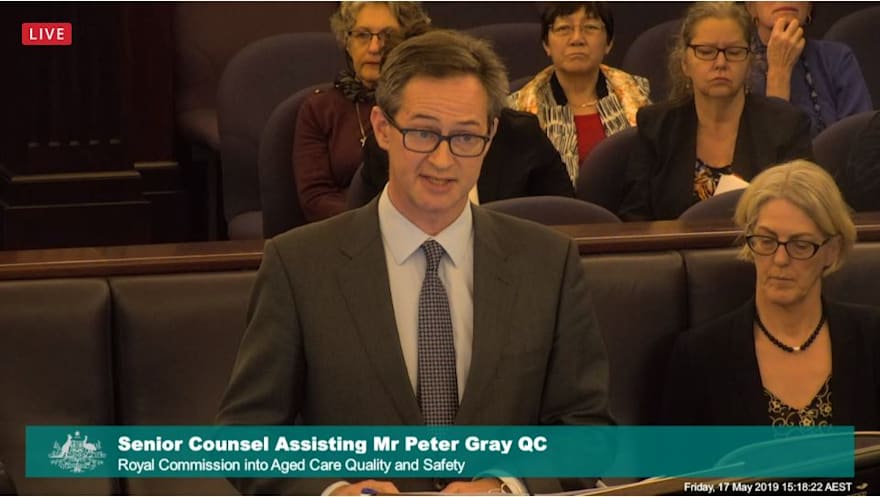Senior Counsel Assisting Peter Gray QC (pictured above) has delivered five “lasting impressions” from the eight days of evidence presented – and they show the Counsel team has a good grasp of the issues at hand:
- Attitudes encountered in residential care and the need for respect and de-stigmatisation – Mr Gray labelled the attitudes towards residents “deeply disturbing”.
“It’s integral to the work of this Royal Commission to call this out for what it is: a denial of the humanity of our fellow human beings,” he said.
- The clinical consensus supports person-centred and relationship-based care – The Senior Counsel said all the clinical evidence points to the need for person-centred care that respects the choices and preferences of the care recipient.
“The Commission has heard evidence of the positive outcomes of this approach to dementia care in terms of reduction in agitation. It is evidently the approach that best enhances the quality of life of the person concerned.”
- The expert consensus that dementia care is not meeting the standards expected – Mr Gray said that the lack of understanding around dementia in the aged care and health sectors is likely to lead to substandard care.
“Regular training about the nature and effects of dementia and what can be done to best care for people living with it is critical. The evidence on the importance of a comprehensive care needs assessment, care plan and ongoing review in residential care is clear.”
- Restrictive practices – the Senior Counsel called these the “antithesis” of person-centred care.
Mr Gray also said it appears providers don’t have a consistent understanding of physical restraints, and there are questions around the effectiveness of the new amendment to the Quality Principles 2014 around restrictive practices that starts 1 July 2019.
“Whether those amendments will prove effective remains to be seen, and will be the subject of further scrutiny as this Royal Commission continues.”
- Organisational leadership, in particular, supporting the workforce – finally Mr Gray stated that good care requires the right staff with the right skills.
“This is a subject the Royal Commission will need to consider carefully in the course of its inquiry. There is clearly a need for better training of aged care management and staff in the proper assessment of the clinical and other circumstances of residents exhibiting behavioural and psychological symptoms of dementia, and the use of non-restrictive interventions.”
In conclusion, the Senior Counsel said what is clear is the need to foster organisational leadership and a culture of care which places the interests and dignity of the resident first.
Mr Gray didn’t offer any closing remarks, however on the findings the Counsel Assisting team are seeking in the four case studies – Terry Reeves at Garden View, Mrs CO at Anglicare’s Brian King Gardens, Mrs CA at Columbia Aged Care’s Oberon Village and Mrs DE at Bupa’s Willoughby facility – presented during the hearings.
Instead, he said they will provide their written submissions to the Commissioners by Wednesday, 29 May 2019 as well as providing a copy to the parties involved if they want to lodge their own submissions.
Mr Gray also announced the next round of hearings will be held in Broome in Western Australia from Monday, 17 June 2019 to Wednesday, 19 June 2019 and Perth from Monday, 24 June 2019 to Friday, 28 June 2019 and will focus on aged care for Indigenous Australians, person-centred care and the delivery of aged care in remote locations.
For a detailed rundown on all the Royal Commission hearings and news, subscribe to The Daily COMMISSION here.










